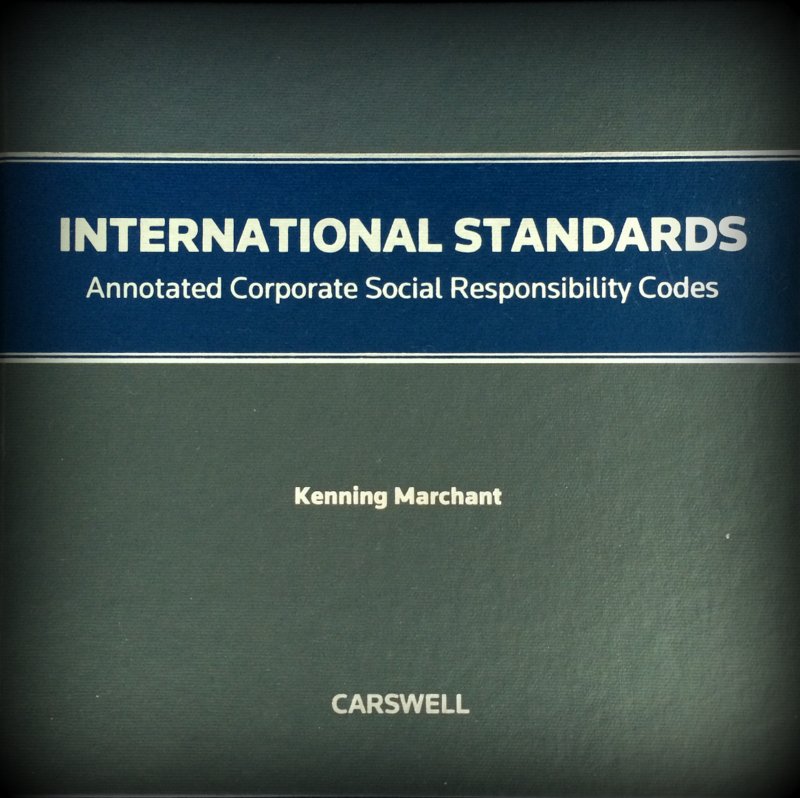 'PECC Guidelines for Good Corporate Governance Practice' (2001, pages 8-16) was published in 'International Standards: Annotated Corporate Social Responsibility Codes' (2014, Carswell, a division of Thomson Reuters Canada Limited). Authored by Canadian lawyer, Kenning Marchant, it is a two-volume compendium carrying various international codes, standards and guidelines on CSR and environmental/ social governance, including stakeholder engagement, environment, consumer relations, disclosure, and reporting. The reference aims to promote global attention to sustainability standards by corporations, their professional advisers, and stakeholders.
'PECC Guidelines for Good Corporate Governance Practice' (2001, pages 8-16) was published in 'International Standards: Annotated Corporate Social Responsibility Codes' (2014, Carswell, a division of Thomson Reuters Canada Limited). Authored by Canadian lawyer, Kenning Marchant, it is a two-volume compendium carrying various international codes, standards and guidelines on CSR and environmental/ social governance, including stakeholder engagement, environment, consumer relations, disclosure, and reporting. The reference aims to promote global attention to sustainability standards by corporations, their professional advisers, and stakeholders.
The PECC Guidelines was authored by Professor Stephen Y. L. Cheung, as the then chair of Core Group on Corporate Governance, PECC PARNet (Peer Assistance and Review Network), as a key outcome of the project and the report was released at the 14th PECC General Meeting hosted by Hong Kong in November 2001. In the aftermath of 1997-1998 Asian financial crisis, PECC noted the critical importance of structural reforms in the governence of the business sector and that these reforms were necessary in order to strengthen the microeconomic base of the region's economies. PECC's work on corporate governance was initiated by PARNet under the leadership of Dr. Jesus P. Estanislao, President and CEO of the Institute of Corporate Directors of the Philippines. Within PARNet, a core group was formed under the chairmanship of Professor Stephen Cheung which led to the guidelines. Transparency, accountability, and fairness are upheld as the guiding principles of corporate governance.
“The inclusion of PECC’s Corporate Governance Guidelines in this collection of international standards is a testament to the work undertaken by the Peer Assistance and Review Network. Since then those dedicated individuals have continued their mission to improve corporate governance in the region not only by undertaking assessments of the implementation of best practices but also by providing training for corporate directors. The spirit of cooperation that underpinned our work continues through the Institutes of Directors in East Asia Network,” commented Professor Cheung.
Dr. Estanislao stated: "I am very happy to note that China is once again serving as the APEC Chair in 2014. It was our privilege to have worked with China, when it served as APEC chair the first time, on the principles and best practices of corporate governance, for consideration and possible adoption by APEC economies.
The leadership that China played at that time contributed towards removing the bias against modern corporate governance, with the bias arising from the widespread acknowledgment that the principles and best practices being then promoted were shaped by the more developed Western economies. With the adoption of the principles and best practices for corporate governance in APEC, under China’s leadership, there has been a growing recognition that indeed modern corporate governance, in fundamental respects, ought to be taken as a global imperative; it promotes greater inter-dependence between economies in the global community, whether developing or developed, and whether in the East or in the West.
There is now a growing need for corporate governance to move beyond mere compliance to a more performance-oriented discipline. With China once again being the APEC chair, I am certain that with her leadership, we can bring corporate governance to this higher level, where corporate governance becomes less a box-ticking exercise and more an exercise in transparency through regular reporting on performance, assessed from the perspective of longer-term strategy maps."
To download the full report, please click here.

 '
'